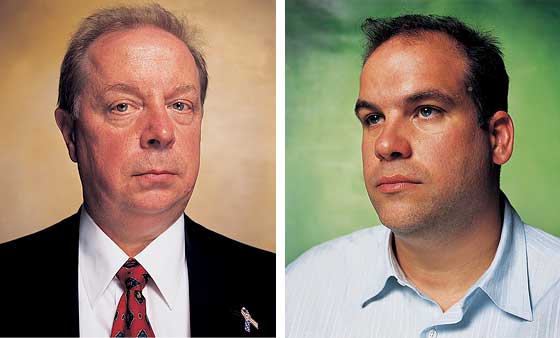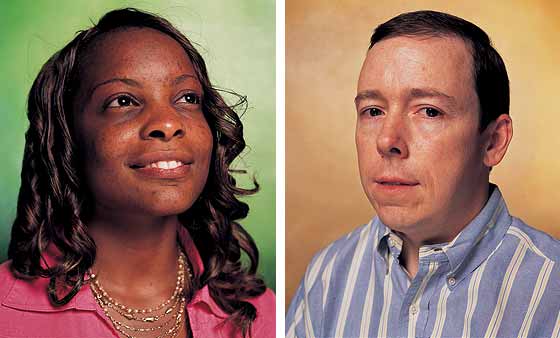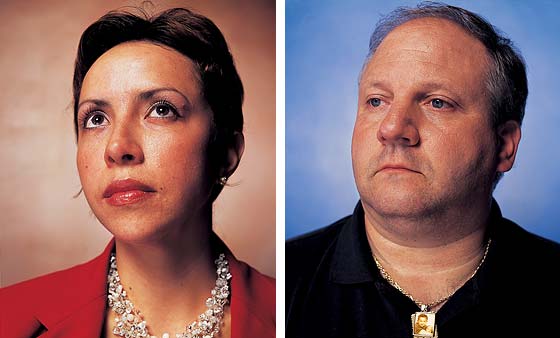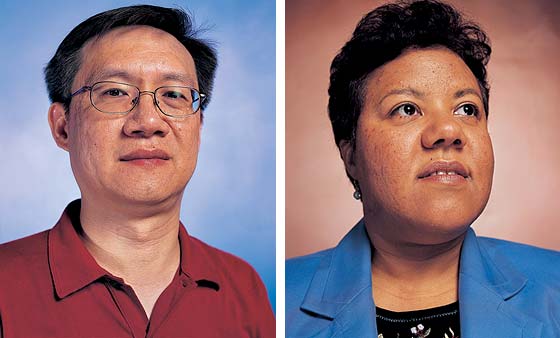
South Tower, 91st floor
The mechanical engineer had just finished making tea when the building heaved from the force of the attack on the North Tower. He helped evacuate the office, then rode an elevator to the lobby, missing the announcement telling employees to return to their desks. He made it onto Cortlandt Street to see a plane pierce the South Tower, “almost like a cartoon.”
Pasquale Buzzelli, 37, right
North Tower, 64th floor
After the tower was hit 30 flights up, the engineer followed fire-safety orders and waited with co-workers until rising smoke convinced them otherwise. He was on the 22nd floor when the stairwell walls began to buckle. He woke up hours later, sprawled on a concrete slab, having fractured only his right foot. He was one of twenty people to be pulled from the rubble alive.
Photo: Andres Serrano
The idea was to check in with the lucky ones, survivors of the attacks on the World Trade Center. Some 18,000 people showed up to work at the towers on September 11, 2001; almost 3,000 died. We wanted to see how these “blessed” people, as they sometimes think of themselves, feel today. New York’s Steve Fishman assembled eight people who were in the towers on September 11 in a conference room at the Benjamin, a midtown hotel. Immediately everyone seemed happy to be in the company of fellow survivors, colleagues and strangers with whom they share that singular bond.
Steve Fishman: Does anyone still flash back to 9/11?
Tom Canavan: Every day. Pass a construction site, smell that concrete powder, and it comes back. Or hear the Metro-North train coming in, the rumble. You have that instant Oh, my God, and then you realize it’s nothing. It’s the train. Or it’s a construction site, that’s all. It could be the most obscure little thing.
Elia Zedeño: Look at the clock and it’s 9:11. And it’s really 7:11, every time.
Manuel Chea: It always happens.
Fishman: It’s the central event of your lives now?
Canavan: It becomes an addiction. For lack of a better word, yeah.
Fishman: How is everybody’s life now? Looking back, what was the hardest part?
Earlyne Johnson: I was very angry for a couple of months. What made me really angry was the therapists: They were like, “Oh, try to go back and do what you normally do.” Well, I normally went to the World Trade Center and went to work! I was like, “No, I can’t go back.”
Canavan: Well, if you want, I will refer you to my therapist. She was excellent.
Fishman: How about medication? Who uses it?
Canavan: I never took so much as an aspirin before. They had me on nine pills a day. I still sleep probably three to four hours a night. What I have is a movie projector in my head, and this movie plays [of the tower coming on top of me]. It’s like your body rests, but your brain doesn’t shut down. It just keeps playing over and over.
Zedeño: I went to work right away; we regrouped in another facility, but I didn’t feel safe. I would go home at night and go into my room and systematically became alienated from just about everybody. At work I would run to and from the bathroom, so I would take my bag with me and make sure that I was ready to run; I kept thinking I was going to get caught with my pants down. [Laughter]
Peter Totten: Only two or three days later, I started commuting to Princeton, where we have a large office. My first task was to deal with the family members—we lost thirteen people—and that was extremely difficult.
Fishman: How did they view you?
Totten: There were a few who were … not antagonistic, but clearly angry. I don’t know that they actually ever said, “Why are you alive and my so-and-so is dead?” but they would be yelling on the phone, and sometimes you just had to let them vent. It was a difficult thing to just sit and take it.
Canavan: I had that. One of the women I was with was killed five feet from me, and I spoke to her family. “Where was she? Was she screaming?” And then finally at the end, it was, “Well, how come you’re alive and she’s not?”
Johnson: Someone asked me, “Why do you think you didn’t die?” and I just kinda summed it up: God isn’t finished with me yet.
Fishman: Was God finished with the others?
Johnson: I don’t think God makes mistakes; you know, if it’s your time to go, you’re going to go.

North Tower, lobby
The communications specialist had just missed the elevator up to her 65th-floor office when she felt an explosion, followed by a hail of shattering glass. She covered her head with her arms, dashed for the exit, then set out to find her 51-year-old, asthmatic mother, who worked on the 73rd floor. She searched for twelve hours, before finding her safe at home in Newark late that night.
Wayne Schletter, 41, right
South Tower, 80th floor
The technology director was mid–conference call when he saw a fireball burst out of the North Tower. Colleagues in London and Hong Kong heard him scream through the phone. He headed for the stairs, stopping on the 56th floor to look out the window and see people jumping. He was on the 44th floor when the South Tower was hit but escaped minutes before it fell.
Photo: Andres Serrano
Zedeño: The way I resolved it was that everyone has to play a role, and this is mine. And it’s not about sitting around trying to answer that question: Why?
Chea: When people say to you, “You’re here for a reason,” there’s a pressure. You’re like, “What the hell is it?”
Zedeño: Everybody told me I was blessed. I didn’t feel that way. For me the question was not only why did I survive, but why did I have to survive? To live with those memories? It was memories that I couldn’t bear.
Fishman: Has the experience changed you?
Johnson: Well, I think I am a totally new person. Before 9/11, I would just get so irritated over small things, but now I’m just, like, go with the flow.
Canavan: My wife says I’m cold now. I’m not afraid of dying anymore because after being buried underneath it, I couldn’t see anything, pitch black, I couldn’t feel anything; the first thing I said was “I’m dead.” But my second thought was “It’s not so bad, it didn’t hurt. If this is what it’s like, it’s not bad at all.”
Fishman: When your wife says you’re cold now, what does she mean?
Canavan: My feelings … I had no patience for my kids and my wife, always snapping. At that point, I said, “I gotta get some help.”
Pasquale Buzzelli: I was distant for a while. I think what saved me is my children. I don’t want them to lose out on having me, you know, and after having survived [starts crying], so they kind of got me out of it.
Fishman: Are you really out of it?
Buzzelli: I thought I was over a lot of things. And then my department moved … I used to work in a two-story building, now I’m traveling up in the elevator to the twelfth floor. I didn’t think I’d have a problem with it, but … I was getting nightmares again, and it wasn’t something where I couldn’t function, but my sleep was starting to get interrupted again. You know, there’s certain things you never really get over. You try to avoid them as much as possible, or certain situations.
Fishman: Is it always the same nightmare?
Buzzelli: Yeah, it’s funny. Out of everything, and it’s not funny, I mean, it’s just weird, out of everything, you know I was in the collapse itself, falling with the building, laying on top of the rubble, and the one thing that I have a nightmare about is being trapped in an elevator … I’m trapped in an elevator and it just starts free-falling. And I have that feeling of falling. And then I wake up.
Fishman: If there were stages to your recoveries, what are they? Anger…
Canavan: Guilt.
Buzzelli: The numbness.
Zedeño: Forgiveness. But it wasn’t about forgiving other people, it was forgiving myself.
Fishman: One survivor told me he felt like it was September 12 all the time. Do you?
Buzzelli: It’s like September 16 now! [Laughter]
Canavan: Is anybody bitter? Like, toward Arabs, whoever, Saudi Arabians or Iranians?

South Tower, 91st floor
The civil engineer was at her desk when she heard the crash of the North Tower exploding. She headed for the stairwell, where people chatted and ate breakfast as they walked down. She was on the fifteenth floor when the plane hit the South Tower but made it out the Church Street exit. She caught the Staten Island ferry just as the South Tower buckled, and found her husband and 4-month-old daughter waiting on the other side.
Tom Canavan, 47, right
North Tower, 47th floor
The securities specialist was wrapping up a conference call when the building was hit. Following protocol, his colleagues locked up important documents before heading for the stairs, which were packed by then. Canavan, who’d found a second stairway, had barely made it into the underground concourse between the towers when the South Tower caved in, burying him in debris and cutting his head. He dug himself out, went for stitches at Beth Israel Hospital, then headed to Grand Central at 3 p.m. to catch a train home to Fishkill.
Photo: Andres Serrano
Zedeño (and others): No.
Canavan: I ask that all the time, and no one is bitter about it. It’s like a wasted emotion for people who survived this. Why am I going to waste my time being bitter? I got over that. I had that intense anger … then right after that I was apathetic about life in general. Work was just feeding the machine.
Chea: I went through that. I went through the motions at work. But you realize that you can’t just go through the motions forever. Because you feel like you’re wasting that miracle that you survived.
Zedeño: The shift happens—and before you actually recognize it.
Canavan: Yeah, everyone notices everything before you do.
Zedeño: People close to you.
Buzzelli: My wife was like, “Oh, you seem so much better,” and I thought, What are you talking about?
Johnson: But you never know what’s gonna trigger you. A couple of weeks ago when the Holland Tunnel had the threat of the bomb, I saw the police and I started crying, I just broke down, and … I had to have a police officer take over and drive me through the tunnel. And it was at that point that I’m like, “You know what, this is not going to go away.”
Sonia Corredor: I always think, “How often are the exits?” and “Which one is going to be closest to me?” I am always more alert, but I don’t feel good—I feel panic. And that doesn’t make me feel good.
Zedeño: If you’re feeling horrible, you’re doing good. Because right when you start recognizing all those horrible things, the shift is happening; it just takes time for you to recognize it. You gotta catch up to it.
Chea: Talking about doing the things you wanted to do, for a while I wanted to do something different from information technology. But I hesitated, because the job was good, the pay was good, and it provided for my family well. Then, boom: I got laid off. I got a nice severance package, and it let me go back to school for a master’s in emergency and disaster management. It’s been great, more time with my kids than I ever had in my life before, more time for my wife, and a focus on working to help others.
Canavan: My father would say—excuse my French—“Sometimes you need a kick in the ass.”
Chea: There is another part of it, too. All of our senses are a little bit more attuned to our environment now. I know in the past, you might’ve heard a rumble of the subway like we heard a few minutes ago, you might not react to that.
Fishman: I didn’t hear anything.
Chea: I heard the subway about five minutes ago.
Canavan: And the fire truck went by.
Fishman: Really?
Chea: You notice things more. Your senses are far more in tune now to anything that can result in an emergency situation.
Canavan: Can anyone see an airplane flying over and not look up?
Zedeño: I think that one of the reasons people are touched by the stories is that in one way or another, everyone is a survivor. Before I was a survivor of terrorist attacks, I was a survivor from Cuba … Somehow you’re always surviving something.
Chea: People love to be connected.
Fishman: Is it as easy to be connected now as it was before 9/11?
Chea: My wife said … up until 9/11 we were on the same page. After 9/11, she says there’s a hole there that can never be filled between us. The 9/11 hole.
Fishman: Earlyne, you got divorced after 9/11. What happened?

North Tower, 49th floor
The computer-systems administrator was checking a server when the building began to sway. Thinking it was an earthquake, he grabbed his backpack and headed for the stairs. He was two blocks away when the South Tower fell.
Elia Zedeño, 46, right
North Tower, 73rd floor
The financial analyst was logging onto her computer when she felt a massive jolt. She bolted for the stairs and made it out just as the South Tower imploded, sending her to the ground and filling her throat with clumps of soot. She walked uptown, not realizing until the afternoon that both towers had collapsed. She hadn’t thought to look back.
Photo: Andres Serrano
Johnson: Well, things were starting to go downhill before that, but after 9/11, I was angry and I didn’t have any patience, and I was like, “You know what? Forget you. I am not going to deal with you and all this other stuff around me.” And even though he was there and trying to be strong, I was like, “Just leave me alone.”
Fishman: How soon after 9/11 did you separate?
Johnson: Maybe two months. And then I moved home to my mom, and that’s all I wanted. I wanted my mom … And I just, I had to be with her because I couldn’t lose her again, and I had to make sure that she was home every night. That day made us so much closer. But now I’m starting to do more things outside of my mom. I’m like, “Okay, now it’s time for my own apartment. I have friends now.”
Fishman: Have you been in a relationship, a serious one, since 9/11?
Johnson: No. I’ve thrown myself into equestrian riding so much … I actually had someone say to me, “If I was in a stall, would you pay more attention to me?” Those friends who are closest to me, who know me best, they know that they say, “Okay, we’re gonna go to your lesson with you, and that’s how we get to spend time.”
Fishman: Do you think not dating has anything to do with 9/11?
Johnson: I’ll say it has to do with 9/11 because of who I am now. Most of us have become better people, freer people.
Fishman: Do you all think you’re better people now?
Wayne Schletter: I was pretty happy to be alive. I wouldn’t call it joy, but you realize you got that bonus round. I could’ve been dead. I’ve accomplished personal things I wanted to do much more so between 9/11 and now than, say, the five years prior to 9/11. You hate to say there was a positive outcome to 9/11, but on a personal level, there’s no doubt.
Fishman: Did the experience make you feel closer to your families?
Canavan: It also causes sort of a rift. I’ve been with my wife almost thirteen years now, and she’ll never understand that day; no matter how much I tell her and how much she sees, she won’t understand it.
Fishman: So you feel like no matter how close you are, you can’t …
Canavan: You can’t explain it to them.
Chea: I’ve experienced the same thing …
Fishman: Is it worse for you, Tom, because when the buildings fell, you were under the rubble for a time?
Canavan: My wife once asked me, “What does it feel like to be buried alive?” And I just couldn’t explain it to her. And I said, “I’ll pull some blankets over you, I’ll throw you in the closet, and I’ll throw some stuff on top of you. And don’t move, and just lay there.”
Fishman: Whom do you feel closest to?
Canavan: I have a bond with the people in this room that I could never have with my family and my wife and my kids. I’ve sat in a room on a panel at Columbia University, just four or five of us in a room, and we had never met before in our lives, and within five minutes—it’s just like right now. I feel like I know you people [in this room]. Everybody feels it, right?
Everyone: Yeah.
Canavan: It’s sort of sad, because I’ll never have that with the people that I love, but I’ll have that with complete strangers.